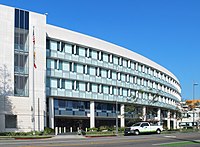
Back RAND Korporasie Afrikaans مؤسسة راند Arabic RAND (organització) Catalan RAND Corporation Czech RAND Corporation Welsh RAND Corporation Danish RAND Corporation German RAND Corporation Esperanto RAND Spanish رند کورپوریشن Persian
  Headquarters in Santa Monica | |
| Predecessor | Spin-off of Project RAND, a former partnership between Douglas Aircraft Company and the United States Air Force until incorporation as a not-for-profit/nonprofit, and gaining independence from both. |
|---|---|
| Formation | May 14, 1948 |
| Founders | |
| Type | Global policy think tank, research institute, and public sector consulting firm[1] |
| 95-1958142 | |
| Legal status | Nonprofit corporation |
| Purpose | |
| Headquarters | Santa Monica, California, U.S. |
| Coordinates | 34°00′35″N 118°29′26″W / 34.009599°N 118.490670°W |
Region | Worldwide |
President and CEO | Jason Gaverick Matheny[2] |
RAND Leadership |
|
President, RAND Europe | Hans Pung[2] |
| |
| Subsidiaries | RAND Europe Frederick S. Pardee RAND Graduate School |
| Affiliations | Independent |
| Revenue | |
| Disbursements | Numerous |
| Expenses | |
| Endowment | $288.7 million (2023)[6] |
| Staff | 1,900 (2023)[7] |
| Website | www |
The RAND Corporation is an American nonprofit global policy think tank,[1] research institute, and public sector consulting firm. RAND Corporation engages in research and development (R&D) in a number of fields and industries. Since the 1950s, RAND research has helped inform United States policy decisions on a wide variety of issues, including the space race, the Vietnam War, the U.S.-Soviet nuclear arms confrontation, the creation of the Great Society social welfare programs, and national health care.
The RAND Corporation originated as "Project RAND" (from the phrase "research and development") in the postwar period immediately after World War II.[8][9] The United States Army Air Forces established Project RAND with the objective of investigating long-range planning of future weapons.[10] Douglas Aircraft Company was granted a contract to research intercontinental warfare.[10] Project RAND later evolved into the RAND Corporation, and expanded its research into civilian fields such as education and international affairs.[11] It was the first think tank to be regularly referred to as a "think tank".[1]
RAND receives both public and private funding. Its funding sources include the U.S. government, private endowments,[12] corporations,[13] universities,[13] charitable foundations, U.S. state and local governments, international organizations, and to a small extent, foreign governments.[13][14]
- ^ a b c Medvetz, Thomas (2012). Think Tanks in America. Chicago: University of Chicago Press. p. 26. ISBN 978-0-226-51729-2. Archived from the original on 29 May 2024. Retrieved 25 April 2015.
- ^ a b c "RAND Leadership". RAND Corporation. Archived from the original on 7 June 2022. Retrieved 8 June 2022.
- ^ "RAND Corporation Board of Trustees". RAND Corporation. Archived from the original on 31 March 2023. Retrieved 16 January 2015.
- ^ "RAND Annual Report 2023, p. 39". RAND Corporation. 10 April 2024. Archived from the original on 24 April 2024. Retrieved 24 April 2024.
- ^ As of September 20, 2023. RAND Consolidated Financial Statements Fiscal Years Ended September 30, 2023 and 2022 (Report). RAND. 8 April 2024. Archived from the original on 24 April 2024. Retrieved 24 April 2024.
- ^ RAND Consolidated Financial Statements Fiscal Years Ended September 30, 2023 and 2022 (As of September 20, 2023) (Report). RAND. 8 April 2024. Archived from the original on 24 April 2024. Retrieved 24 April 2024.
- ^ 2023 RAND Annual Report (Report). RAND. 10 April 2024. Archived from the original on 29 May 2024. Retrieved 24 April 2024.
- ^ Abella, Alex (2009). Soldiers of Reason: The RAND Corporation and the Rise of the American Empire. Boston and New York: Mariner Books. p. 13. ISBN 978-0-15-603344-2. Archived from the original on 23 April 2023. Retrieved 31 October 2021.
- ^ RAND History and Mission Archived 17 August 2010 at the Wayback Machine. Accessed 13 April 2009.
- ^ a b Johnson, Stephen B. (2002). The United States Air Force and the culture of innovation 1945-1965. Diane Publishing Co. p. 32. ISBN 978-1-4289-9027-2. Archived from the original on 29 May 2024. Retrieved 26 April 2024.
- ^ "RAND Corporation - GuideStar Profile". www.guidestar.org. Archived from the original on 10 March 2023. Retrieved 10 March 2023.
- ^ "2023 RAND Annual Report". RAND Corporation. 10 April 2024. Archived from the original on 24 April 2024. Retrieved 25 April 2024.
- ^ a b c "How We're Funded". RAND Corp. Archived from the original on 5 August 2011. Retrieved 16 January 2015.
- ^ Monica, 1776 Main Street Santa; California 90401-3208. "How We Are Funded: Major Clients and Grantmakers of RAND Research". www.rand.org. Archived from the original on 23 February 2023. Retrieved 10 March 2023.
{{cite web}}: CS1 maint: numeric names: authors list (link)